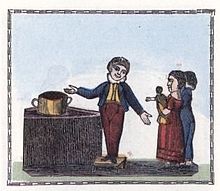Peter Piper
| "Peter Piper" | |
|---|---|
 Illustration from Peter Piper's Practical Principles of Plain and Perfect Pronunciation (1836 American ed.) | |
| Nursery rhyme | |
| Published | 1813 |
"Peter Piper" is an English-language nursery rhyme and well-known alliteration tongue-twister. It has a Roud Folk Song Index number of 19745.[1]
Lyrics[]
Common modern versions include:
- Peter Piper picked a peck of pickled peppers.
- A peck of pickled peppers Peter Piper picked.
- If Peter Piper picked a peck of pickled peppers,
- Where's the peck of pickled peppers Peter Piper picked?
- Peter Piper picked a peck of pickled peppers.
- If Peter Piper picked a peck of pickled peppers,
- How many pickled peppers did Peter Piper pick?
Origins[]
The earliest version of this tongue-twister was published in Peter Piper's Practical Principles of Plain and Perfect Pronunciation by John Harris (1756–1846) in London in 1813, which includes a one-name tongue-twister for each letter of the alphabet in the same style. However, the rhyme was apparently known at least a generation earlier.[2] Some authors have identified the subject of the rhyme as Pierre Poivre, an eighteenth‑century French horticulturalist and government administrator of Mauritius, who once investigated the Seychelles' potential for spice cultivation.[3][4]
References[]
- ^ "English Folk Dance and Song Society Song Index". Vaughan Williams Memorial Library. Retrieved 15 September 2020.
- ^ H. Carpenter and M. Prichard, The Oxford Companion to Children's Literature (Oxford University Press, 1984), p. 408.
- ^ Hassall, S.; Hassall, P.J. (1988). "Exploration, Discovery and Settlement". Seychelles. Places and People of the World. Chelsea House. p. 26. ISBN 0-7910-0104-0.
- ^ Lionnet, Guy (1972). "Geography, Geology and Government". The Seychelles. The Islands Series. Stackpole Books (U.S.)/David & Charles (UK). p. 28. ISBN 0-8117-1514-0.
External links[]
- Text of Peter Piper's Practical Principles of Plain and Perfect Pronunciation at Project Gutenberg
 Peter Piper public domain audiobook at LibriVox
Peter Piper public domain audiobook at LibriVox
- Tongue-twisters
- English nursery rhymes
- English folk songs
- English children's songs
- Traditional children's songs
- Nursery rhymes of uncertain origin
- Songs based on children's songs
- Songs about fictional male characters